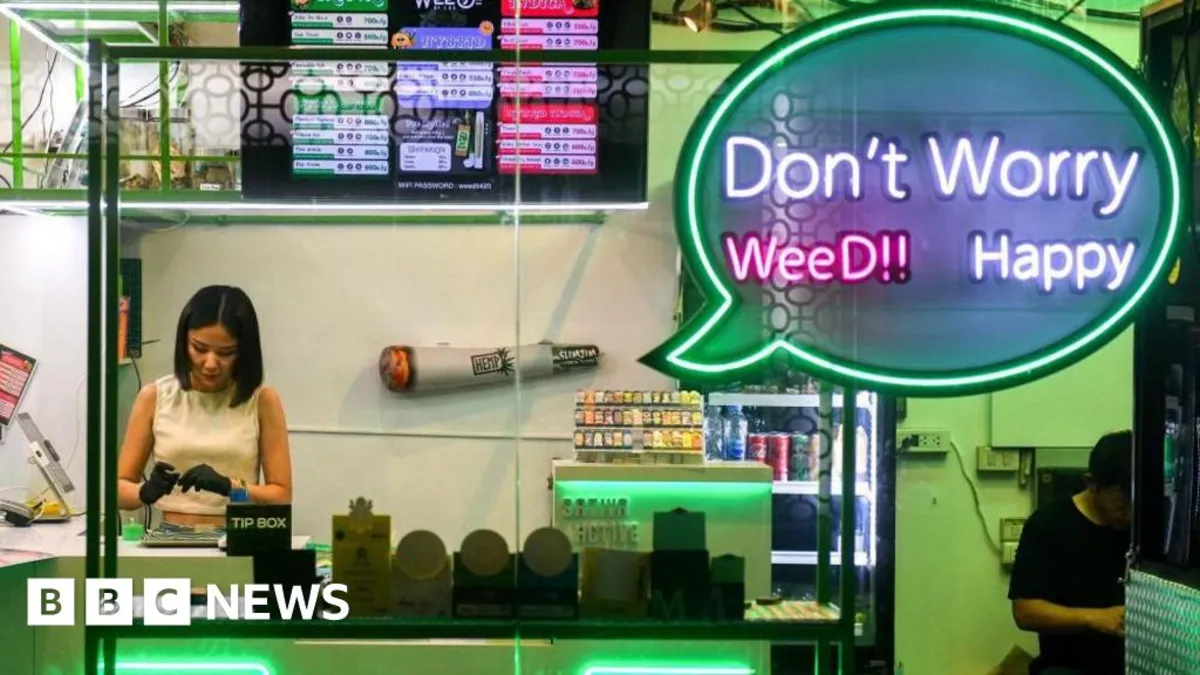
In a significant development for the cannabis industry, Thailand is taking steps to rein in its previously decriminalized marijuana market. The Thai government has recently approved measures aimed at restricting marijuana consumption, limiting it to individuals with a doctor’s prescription. This decision comes as officials grapple with a booming industry that many are calling out of control.
The initiative was announced by the public health minister, who indicated that there are plans to criminalize marijuana consumption once again. However, the timeline for this change remains uncertain. Since the decriminalization of cannabis in 2022, Thailand has witnessed an explosion in investment, resulting in approximately 11,000 registered cannabis dispensaries throughout the country. In bustling areas of Bangkok, neon signs advertising these dispensaries are ubiquitous, and the distinct smell of marijuana fills the air.
One notable example of this trend is Khao San Road, a popular backpacker destination, where an entire shopping mall is dedicated to selling marijuana accessories and hallucinogenic flower heads. Additionally, derivative products such as brownies and gummies are readily available online, despite being technically illegal, with delivery options promising arrival within an hour.
Calls for regulatory action are not new. The largest party in the current government coalition had previously sought to reclassify cannabis as a prohibited narcotic following its rise to power in 2023. However, this initiative faced resistance from a former coalition partner, which had championed the decriminalization of cannabis as a key election promise. Recently, increased pressure from the UK, where smuggling incidents involving Thai marijuana have surged, appears to have been a tipping point for action.
Authorities in the UK report a troubling trend of young travelers being recruited by drug syndicates to transport cannabis from Thailand. Just last month, two British women were arrested in Georgia and Sri Lanka while carrying large quantities of Thai marijuana, facing the prospect of lengthy prison sentences. The UK’s National Crime Agency (NCA) has noted a dramatic increase in the number of couriers apprehended; 142 couriers were caught in 2023, escalating to 800 in 2024.
Despite these alarming statistics, the NCA is collaborating with Thai authorities to deter young people from smuggling cannabis to the UK. However, the lack of stringent regulations in Thailand complicates enforcement efforts. Panthong Loykulnanta, spokesman for the Thai Customs Department, highlighted a significant loophole: while profits from cannabis smuggling are high, penalties for those caught are relatively low, allowing many individuals to escape serious consequences.
The legalization of cannabis in Thailand in 2022 was initially expected to be followed by a comprehensive regulatory framework; however, that has not materialized, primarily due to interference from vested interests within the marijuana industry. Although a new cannabis law was drafted last year, it may take up to two years for it to be enacted, leaving a fragmented and chaotic market in its wake.
The current situation has led to a “weed wild west” environment where nearly all aspects of marijuana commerce are tolerated. The influx of foreign drug syndicates utilizing Thai fronts to produce vast quantities of potent marijuana has exacerbated the issue, contributing to a decline in prices that has attracted smugglers. Tom Kruesopon, a businessman involved in the legalization efforts, expressed his concern about the situation, stating, “You cannot have a free-for-all.”
Many cannabis advocates oppose the proposed regulations, arguing that they will do little to stem smuggling and will disproportionately impact small-scale growers already struggling due to market oversaturation. Recently, a group of smaller growers protested at the prime minister's office, advocating for a more nuanced regulatory approach that addresses their concerns rather than reacting impulsively to international criticism.
Activists like Kitty Chopaka recognize the pressure the Thai government faces from other nations regarding cannabis smuggling. However, they argue that the government is not effectively enforcing existing regulations, which could help mitigate issues related to smuggling and unauthorized sales. Meanwhile, growers like Parinya Sangprasert assert that illegal operations will continue to thrive, regardless of new regulations.
As Thai customs officials continue to combat cannabis smuggling at airports, they are employing intelligence to target potential offenders, yet the penalties for those caught remain minimal. The challenge lies in balancing the economic opportunities presented by the cannabis industry with the need for effective regulation to protect both the market and public health.
Overall, the future of Thailand's cannabis industry hangs in the balance as the government seeks to implement new regulations while grappling with the realities of a rapidly evolving market.